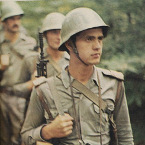SharonC
Posts: 28
Joined: 6/6/2019
Status: offline

|
The new DLC of Armored Brigade, Nation Pack: France - Belgium, will be released on October 31st. Below you'll find an in-depth analysis of the French army, looking closer to its strategies and features. The specs of Belgium will follow soon.
France
As mentioned previously, while the bloodletting of World War I has left the French military a firm believer in the prevalence of firepower over manoeuvre, so did France's defeat by Germany in 1940 led it to a similar swing in the direction of mobile warfare. Their Cold War tactics were tank-heavy and closer to US Armored Cavalry Regiments (or, indeed, their own pre-WW2 Division Légère Mécanique) in that their formations were not intended for holding ground. Like the DLM of 1940, the mechanized regiments were to operate like the earlier dragons portes, locating and delaying the enemy and preparing the situation for a counter strike by the tank regiments.
By the 1980s the French army had transitioned to small armored divisions and saw an increase in the proportion of infantry, though French “divisions” never amounted to much more than a brigade in real terms. These divisions were composed composed of task-organized combined arms regiments (essentially large battalions) which mixed tank and mechanized infantry companies on a permanent basis. The French doctrine saw these divisions operating on rather wide frontages, with uncovered flanks if necessary, and seeking to outflank the enemy rather than engage him head-on.

Here we can see dismounted block-force in the village laying ambush to the advancing Soviet armoured column, delaying them long enough so French light tanks and supporting paratroopers can organize to strike on flanks.
Backing up the draft-based armored and mechanized divisions of the Metropolitan Army were the expeditionary forces of the Force d'Action Rapide, a collection of volunteer-manned light armored, parachute, mountain, airmobile, and marine units. Although mainly intended for overseas use due to their all-volunteer manning, their capabilities would have been useful in an overall NATO-Warsaw Pact conflict.

“Boxing maneuver”. Deliberately lured deep into the French lines, Soviet unit is encircled and destroyed by weaker, yet more mobile French force.
Head-on engagements were eschewed except as a way to fix the enemy for an enveloping maneuver, and fighting in built-up or wooded areas was similarly to be avoided due to the low infantry strength of French formations and the advantage the artillery-heavy Soviet Army would have in such grinding attritional battles. In this regard the French army differed from the Bundeswehr which, although also a maneuver-oriented force, intended to fight for every inch of the battlefield.

The deadly effect of grinding battle against Soviet Army in the urban area.
The weak point of the French ground forces was equipment. The French strategic nuclear deterrent took up such a large portion of the defense budget that in many respects French forces lagged behind other premier NATO armies in certain technical aspects. The most notable French weakness was the failure to field a modern main battle tank during the 1980s comparable to the Leopard 2, M1 Abrams, or even the rather less successful Challenger 1. The highly sophisticated Leclerc MBT finally entered service only in the 1990s. As a result of the French MBT lag, the French forces would have had to rely more heavily on anti-tank guided missiles, such as the MILAN, HOT and SS-11. Another quite noticeable weakness in-game terms is lack of stabilization on most of the French guns.

Speed and maneuver without stabilization will likely result in heavy casualties if “all guns blazing - on move” approach is applied. Player should rather use greater mobility of French forces to dictate the tempo of operations: quick redeployments should be used to set ambushes and flank attacks to inflict damage and then disengage before enemy can bring his firepower to bear.
< Message edited by Daniele -- 1/14/2020 8:59:35 AM >
|
 Printable Version
Printable Version










 New Messages
New Messages No New Messages
No New Messages Hot Topic w/ New Messages
Hot Topic w/ New Messages Hot Topic w/o New Messages
Hot Topic w/o New Messages Locked w/ New Messages
Locked w/ New Messages Locked w/o New Messages
Locked w/o New Messages Post New Thread
Post New Thread